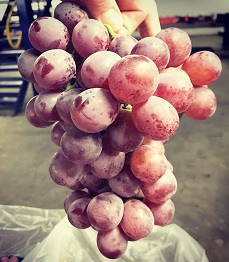 Rain over the weekend in the Hex River Valley has brought packing to a standstill as growers assess damage and the need for post-rain spraying programmes, which have implications regarding withholding periods, so that packing will resume by Thursday or Friday this week – unless it rains again tomorrow, in which case packing can only resume next week.
Rain over the weekend in the Hex River Valley has brought packing to a standstill as growers assess damage and the need for post-rain spraying programmes, which have implications regarding withholding periods, so that packing will resume by Thursday or Friday this week – unless it rains again tomorrow, in which case packing can only resume next week.
The harvest started earlier this year in the Hex River Valley which was a help, as many early varieties were already harvested before the rain came. Crimson, major grape variety in the area, aren’t ripe yet so those blocks could in fact benefit from the rain.
A number of growers report that their Crimson, Sweet Celebration and Sweet Globe blocks look to be unaffected, while it’s mostly sensitive varieties that have reacted badly, but even there are exceptions. On a cultivar like Midnight Beauty, widely mentioned as a variety sensitive to rain, there are growers who say their Midnight Beauty looks unscathed.
Other sensitive varieties are Thompsons, Flame, Sunred Seedless, Sundance Seedless, late Tawny.
There is a complex combination of factors that determine a block’s reaction to unseasonal rain, including the prior water stress of a vineyard. Most rain fell in the north of the Hex River Valley, towards Touwsrivier, which was also the most water-stressed area still in the Hex – until this rain came, so that is a silver lining to the weekend’s rain.
Rain brings unplanned costs
Unseasonal rain is a costly affair for Cape grape growers, both in terms of money and labour.
“On our farms we’ve decided not to resume work in the vineyards, like spraying against botrytis or to dry out cracks, as we wait to see whether it rains tomorrow as predicted,” says Gert Mans, Exsa marketing. “If you start spraying today and it rains again tomorrow, you have to redo it and it’s an expensive exercise. We’ll be led by the grapes and their condition in deciding when packing will resume.”
The South African Table Grape Industry visited the valley yesterday, a large area where the harvest can differ up to 10 days from south to north. “There’s definitely no need for panic,” says Clayton Swart, SATI communications manager. “It was an unusually large amount of rain for this time of the year, but the rain was predicted and many growers covered their blocks about to be harvested with plastic.”
One Hex grower tells FreshPlaza that their Sweet Sapphire was kept completely dry by plastic during the deluge.
In the Ondervallei, towards Worcester at the southern entrance to the valley, rainfall was about a quarter of that which fell in the northern part. In a press release SATI notes that the bulk of the Hex River crop is made up of mid to late cultivars, “which are stronger and in any event still unripe, which means that rain hardly affects it negatively. In fact, there is even relief in some areas where water availability was a concern. The crop estimate for this region remains unchanged and the outlook positive.”
They also point out that the valley didn’t experience the winds that were felt along the coast and while a minimal amount of blocks suffered damage to their anchor poles, wind damage is minute within the industry.
Last year the Hex River Valley also had rain during harvest, which dented exports from the area, but that rain came much later, abbreviating the end of the season.
“It’s not nice and it’s not welcome, but it’s the farmer who can manage the unwelcome realities in the best way who’s going to survive,” says a Brandwacht grape farmer.
